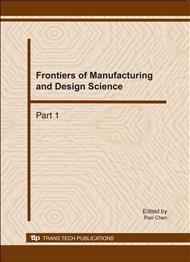[1]
PU Hua-sheng, LI Rui-min, ZHU Yin: the conspectus of intelligent transportation system(China railway publishing house, China 2004).
Google Scholar
[2]
WANG Zheng-wu, HUANG Zhong-xiang: Analysis and discussion on short-term traffic flow forecasting . Systems Engineering . Vol. 11(2003), pp.97-100.
Google Scholar
[3]
WANG Jin, Shi QI-Xin: The summery of the short-term traffic flow predicts model. China Public Security Vol. 1(2005), pp.92-98.
Google Scholar
[4]
HAN Chao, SONG Su , WANG Cheng-hong: An improved multi-step adaptive forecasting method for short-term traffic flow. Journal Of Highway And Transportation Research And Development Vol. 22(2005), pp.1530-1535.
Google Scholar
[5]
YANG Zhao-sheng, ZHU Zhong: A real time traffic volume prediction model based on the kalman filtering theory. China Journal Of Highway And Transport Vol. 3(1999), pp.88-89.
Google Scholar
[6]
D.K. Merchant, GL. Nemhauser: Optimality conditions for a dynamic traffic assignment model. Transportation Science Vol. 12(1978), pp.200-204.
DOI: 10.1287/trsc.12.3.200
Google Scholar
[7]
WANG Jin, SHI Qi-xin: Study of the short-term traffic flow forecasting based on nonlinear theory, Journal Of Xi'an University Of Architecture &Technology/(nature science edition) Vol. 2(38)(2006), pp.184-188.
Google Scholar
[8]
HUANG Kun, CHEN Sen-fa, ZHOU Zhen-guo, QI Xi: Research on a nonlinear chaotic prediction model for urban traffic flow. Journal of Southeast University (English Edition) Vol. 19(4) (2003), pp.410-413.
Google Scholar
[9]
ZONG Chun-guang, SONG Jing-yan, REN Jiang-tao, HU Jian-ming: Short-term traffic flow forecasting research based on phrase space reconstruction. Journal Of Highway And Transportation Research And Development Vol. 4(2003), pp.71-75.
Google Scholar
[10]
NIE Wei, SHAO Chun-fu, YANG Li-ya, NIU Xue-jun: Application of fractal theory in freight volume forecast, logistics technology Vol. 2 (2007), pp.104-109.
Google Scholar
[11]
DONG Hong-zhao, LIU Dong-xu, CHENG Ying, ZHAO Yan-wei: Research of fractal-based extend enterprise. Journal Of Zhejiang University (Engineering Science) Vol. 1(2004) , pp.11-16.
Google Scholar
[12]
FENG Wei-dong, HE Guo-guang, LIU Bao: Study on traffic flow self organization and ITS management control model based on self organization theory. System Engineering Theory& Practice Vol. 1(1999), pp.1-9.
Google Scholar
[13]
MA Xiu-feng: The study of control and guidance in ITS. Doctor Paper,. Tianjin University, (1999).
Google Scholar
[14]
LIU Xiao-cheng, WANG Yan-ming: Prediction of the petroleum price based on the fractal theory. Journal Of Xi'an Shiyou University(social sciences) Vol. 1(2006), pp.5-10.
Google Scholar
[15]
DONG Hong-zhao, XU Jian-jun, GUO Ming-fei: Traffic flow short-time prediction using fractal theory, 2008 Chinese Control and Decision Conference(OODC2008), 4581-4585.
DOI: 10.1109/ccdc.2008.4598215
Google Scholar
[16]
LU Jin-hu, LU Ju-nan, CHEN Shi-hua: Analysis and application of chaotic time series, (Wuhan university publishing house, China 2004).
Google Scholar


